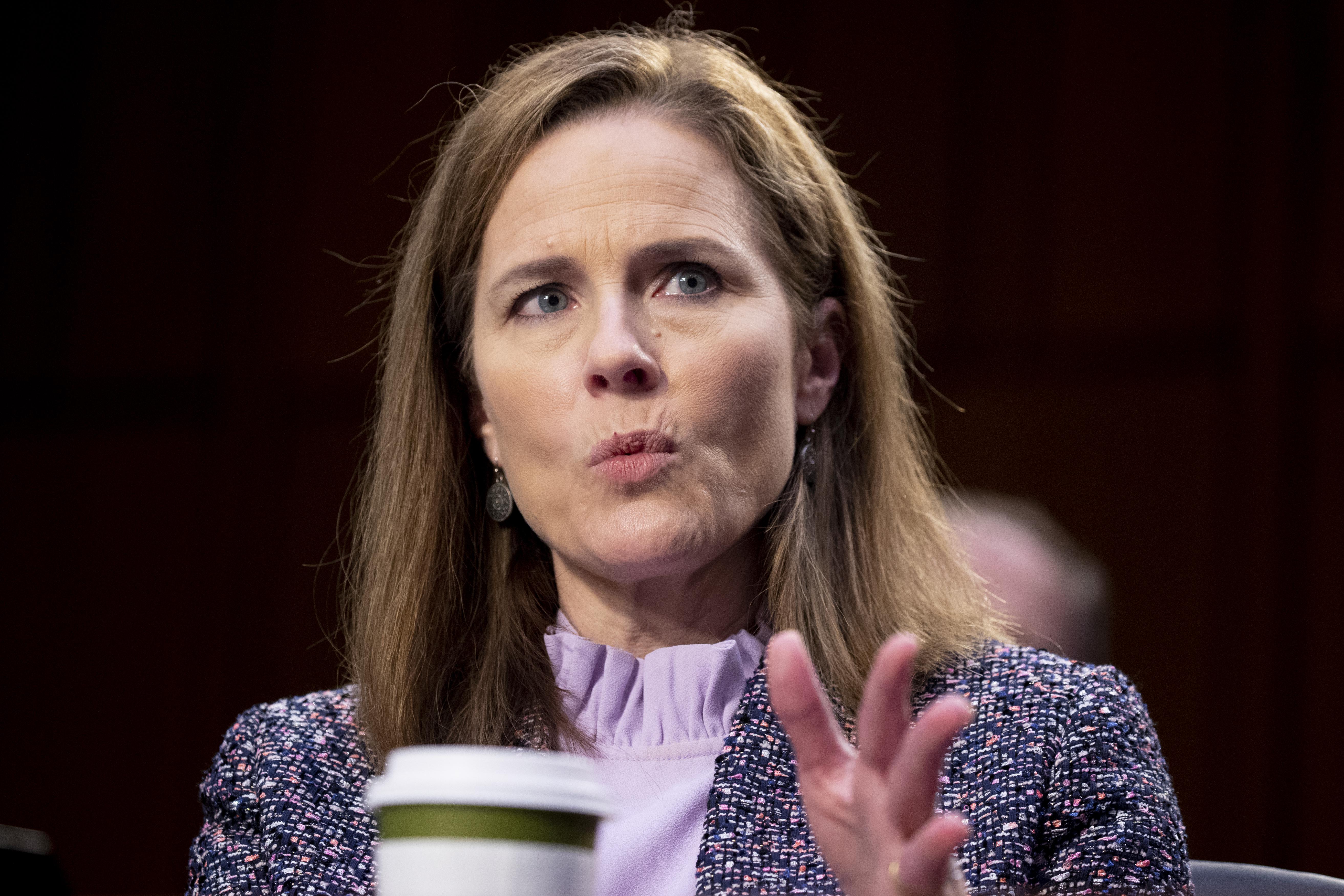Judge Amy Coney Barrett’s testimony before the Senate Judiciary Committee this week has largely consisted of her refusing to answer any question of substance because, she argues, it wouldn’t be proper for a prospective justice to do so. This has made her appearance an epic performance of deflection even compared with past Supreme Court confirmation hearings. As I noted on Tuesday, being Donald Trump’s nominee means you have to refuse to answer even the most basic questions lest you defend the indefensible or criticize the man elevating you to the court. Those deflections have included Barrett’s refusal to say whether presidents should commit to a peaceful transfer of power (Trump hasn’t), whether they should be able to pardon themselves (Trump has suggested he might), whether voter intimidation is illegal (it is).
On Wednesday, though, Barrett’s failure to respond reached a new height when she refused to discuss whether removing children from their parents at the border as a deterrent, as the Trump administration illegally did in 2018, is wrong. The moment came when Sen. Cory Booker asked Barrett if she believed it is “wrong to separate children from their parents to deter immigrants from coming to the United States.” Barrett responded that she couldn’t weigh in on government-sanctioned kidnapping, as it is “a matter of policy debate” that she can’t “be drawn into as a judge.”
Here is the video of the exchange:
And here is the full text:
Booker: Do you think it’s wrong to separate children from their parents to deter immigrants from coming to the United States?
Barrett: Sen. Booker, that’s been a matter of policy debate and obviously that’s a matter of hot political debate in which I can’t express a view or be drawn into as a judge.
Booker: I respect that a lot, but I think the underlying question is actually not hotly debated. And just maybe I’ll ask it one more time. Do you think it’s wrong to separate a child from their parent, not for the safety of the child or parent, but to send a message? As a human being, do you believe that’s wrong?
Barrett: Senator, I think that you are trying to engage me on the administration’s border separation policies, and I can’t express a view on that. So I’m not expressing assent or dissent with the morality of that position. I just can’t be drawn to a debate about the administration’s immigration policy.
Booker: Of course, the question does have implications, but a very simple—as I stated yesterday, that we’re debating things that to me are basic questions of human rights, human decency, and human dignity. I’m sorry that we can’t have a simple affirmation of what I think most Americans would agree on.
Early in the president’s term, the Trump administration was warned repeatedly that any “policy” of ripping babies, infants, and other children from their parents at the border in order to deter immigration would not only be illegal but would traumatize many of those children for the rest of their lives. The White House went ahead with the “policy” anyway and only abandoned it after widespread horror when details of the practice emerged to the public. Thousands of children were separated from their parents, including at least one nursing 4-month old.
A George W. Bush–appointed District Court judge in California, Dana Sabraw, ruled in 2018 that the separation policy was “brutal, offensive, and fail[ed] to comport with traditional notions of fair play and decency” as well as a blatant violation of the due process clause of the Constitution. He ordered that separated children must be returned to their families, which became a Herculean task for the government because, as multiple inspectors general later found, there was no plan in place to ever return the children when they were taken. The ACLU, which brought the lawsuit, still hasn’t been able to confirm whether hundreds of separated children who were discharged from government custody were ever able to reunite with their parents.
In other words, what Barrett described as a “policy debate” is really an unconstitutional case of government-run kidnapping whose impacts on individual children will reverberate for generations. It has been roundly rejected in court without the Trump administration even attempting to appeal. The question of its legality is also not the subject of active litigation, which means it is not a pending controversy she is liable to face as a member of the court.
In 2018 when Brett Kavanaugh was asked about the legality of child separation by Sen. Kamala Harris, he declined to answer because at the time, it was a matter of pending active litigation before the courts. Barrett faces no similar dilemma. She was asked a question about her opinion on the morality of this administration’s horrific efforts to subvert the rule of law, not about any pending legal case, and she refused to answer because, apparently, this policy is still something that is up for debate in her mind.
